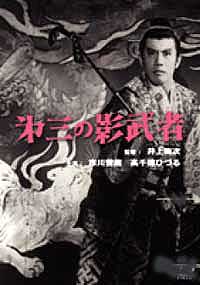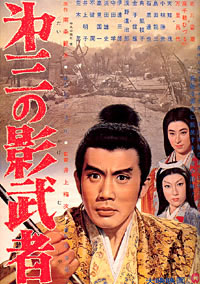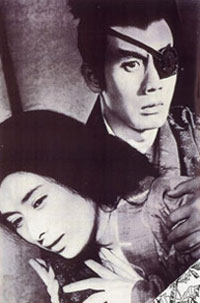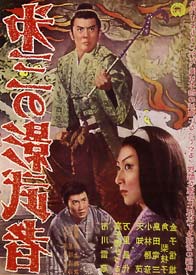 From a novel by Norio Nanjo, Daisan no kagemusha (The Third Shadow aka Third Shadow Warrior, 1963) stars Raizo as a farmer's son who wants to be a samurai, & gets the chance due to his physical resemblance to Lord Yasutaka (permitting Raizo to play a double role). From a novel by Norio Nanjo, Daisan no kagemusha (The Third Shadow aka Third Shadow Warrior, 1963) stars Raizo as a farmer's son who wants to be a samurai, & gets the chance due to his physical resemblance to Lord Yasutaka (permitting Raizo to play a double role).
Norio Nanjo was a leftist writer famous for his contes cruel, & whose work inspired the relentless Bushido: Samurai Saga (Bushido zankoku monogatari, 1963).
In such serious-minded left-leaning samurai films as The Third Shadow, or Daisuke Ito's Retaliation of Gonza (Kono kubi ichiman-goku, 1963), a peasant crossing the class barrier will soon be sorry for his presumption.
And it's intriguing that such films with proletarian politics imbedded in them, even though criticizing harshly the ruling class, ends up, against intent, upholding the class system. For our hero couldn't possibly have had such an unlucky life if he'd been satisfied with his peasant status.
Set in 1567 in the mountain regions of Hida, the peasant Kyonosuke becomes a Lord through being an imposter. His dream to be a samurai leads to ironic tragedy in this exemple of the genre called "cruel historicals" or zankoku jidai-geki.
 He is the third of three "shadow men" & the one who looks the most like Lord Yasutaka. He is the third of three "shadow men" & the one who looks the most like Lord Yasutaka.
When Yasutaka loses an eye in battle, one of the shadows runs away, knowing full well what is in store, but fails to escape & is killed. The other two are blinded in one eye so that they will remain good shadows for the lord.
SPOILER ALERT! When the lord loses an arm in battle, only Kyonosuke is in a position to help him. But now understanding this will mean one of his own arms will be chopped off, he elects to kill the lord & flee, intending to continue his pursuit of a samurai career elsewhere.
He doesn't get far. He is offered the chance to replace the Lord so that no one finds out he is missing, though no one other than himself knows the it was himself, the shadow, who killed the missing lord.
To this point, the story has been excellent for adventure & action, but inexplicably the tale becomes an eerie fight for personal identity, similar to Akira Kurosawa's Kagemusha (1980) when the lord's imposter (Tatsuya Nakadai) feels he is dying as armies are wiped out before his eyes, though in fact he has no real connection with those armies.
No one believes Kyonosuke's raving insistence that he is a peasant, not a Lord. He ends up locked up as a madman for the rest of his life, the Lord's insanity becoming the clan's most closely guarded secret. END SPOILERS
 Director Umetsugu Inoue had his first Japanese film retrospective in America in the late 1990s, arranged through the Pacific Film Archive & the University of California at Davis.
Director Umetsugu Inoue had his first Japanese film retrospective in America in the late 1990s, arranged through the Pacific Film Archive & the University of California at Davis.
At that time Japanese film historians in the west belatedly realized his genius & unconventionality. In addition to his career in Japan in the late '50s & '60s, he worked for Shaw Brothers in the late 1960s & early 1970s.
His most significant films were musicals & he may well be the most important director of musicals ever to come out of Japan.
Despite a penchant for comedy, he was also influenced by cinema verite from Europe, so that some his "musicals" weren't musicals in the nominal sense, but hard-hitting dramatic tales of jazz musicians, though certainly he also did song & dance films beautifully. And a gloomy serious jidai-geki like The Third Shadow was quite obviously not outside his field of genius, as also gangster films.
The Third Shadow is a nearly unknown masterpiece from this unjustly neglected director. The cinematography (by Shozo Honda) is extraordinary with maximum use of widescreen & amazing use of shadow & darkness as part of the compositions, besides a plot worthy of the cruelties & identity-conflicts of Kafka transposed to a samurai environment.
copyright © by Paghat the Ratgirl
|

